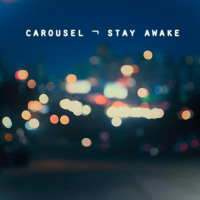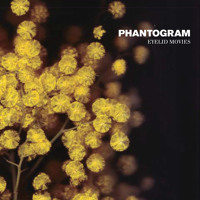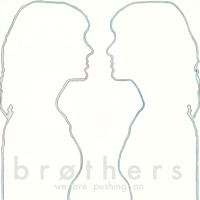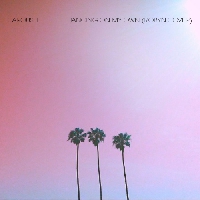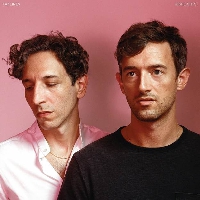
Brooklyn-based duo Tanlines is prepping to release their sophomore album, Highlights, dropping May 19 via True Panther.
I was able to wrangle time with the busy Jesse Cohen, half of the successful indie group. Self-aware and pointed, Jesse talked about recording in Chris Taylor's (of Grizzly Bear) church in Brooklyn, how the guys applied their experiences on the stage to this record, and the growth they have expressed in their music from their 2012 album Mixed Emotions.
See what their journey was like, and take a listen to their first single, "Slipping Away," before the record releases this month.
You guys are going on tour soon?
We are doing a week of shows around the album in May, just New York and L.A., and then we’re going on a full tour in June/July.
And you are coming out to San Francisco for Phono del Sol, right?
We heard it was a cool thing, that the people running it really love music, so we thought it was cool. I mean, we will have to come back at some point and do a nighttime club show, but I’m pretty excited to have this date on the calendar.
You guys have played here a few times. I’ve seen you at the Rickshaw.
Yes!
So maybe next time the Independent?
We’ve played there, too, actually, but it was some sort of party for Rdio.
I know you’ve probably answered this a million times, but for those who are unfamiliar, where did the name Tanlines come from?
Well, it was just sort of one of those things where we needed a name, we had a song, and we had to put it out on the Internet. We needed a name, and were thinking about a lot of stuff. My explanation for the name is... it’s where the sun meets the shade, basically; it’s the line between light and dark. It’s like, part of you is in the sun, part of you is not in the sun, and that’s where the tan lines are. That’s also how I kind of describe our music. It’s a mix of sunny and dark, and happy and melancholic, and a lot of things really.
I think that makes sense. I mean, the melodies that you guys create have a very sunny disposition [on the surface] but if you really listen to the lyrics a lot of times they are carrying heavier themes to them.
Yeah. That also comes out in my relationship with Eric. A lot of that does, too.
What have you guys been up to since your last album, Mixed Emotions, besides putting this album together?
You know, a lot of the time was spent touring and playing shows after the last album. We kind of couldn’t, or didn’t, really get started with the new album until we were like done touring the first album. We haven’t been very good at doing both those things at once. Like, we can’t really write on the road, and so the last album kind of went a lot longer. A lot of the time was spent on that. And then, you know, just life stuff. Take a little break and do life for a little while, and then get back in the studio. We worked for a long time on this album. We worked for like a year and a half or something. It took a long time.
Let’s talk about this new album, Highlights. How did it develop?
We started out in Pittsburg at Eric’s parent’s house while they were away and we spent like a week and a half there writing and working on music. Our idea really for this album was to work in new places, it was to not just sit in front of the computer at Eric’s studio and write the album. It was like let’s try to write in other cities, other studios, we wanted to work with a producer. We wanted to sort of extend the depth of our workflow and also the kind of songs we wrote, and the emotional stuff, all that stuff. We wanted to try to take it further, for lack of a better word. So, the first thing we did was we went to Eric’s home town and we wrote in Pittsburg, and that’s where our computer exploded and we wrote songs just on guitar and drums - that’s “Invisible Ways.”
So that was the first thing we did for the album and after that we were like we don’t want to write an album that’s just like guitar and drums but this is the best song we’ve written so far. It was a lot of sort of moving back and forth between electronic and organic production. We went to LA and we worked there, and that was again more drums and acoustic stuff. Then we went back to Eric’s house and it was more electronic again, and then when Chris Taylor [of Grizzly Bear] came on board to help us finish the album, to produce it, we wanted to work with him because he works out of this church in Greenpoint and it was like the opposite of working in the box.
After we finished working with Chris, we mixed it with this guy Rob Kinelski who’s kind of a hop hop mixer, and then it was like back in the box. It was sort of this long ping-pong between electronic and acoustic kind of production. I think that this shows on the album. I think that that’s the sound of the album. If I were to describe the sound, it’s like a wider mixture of those two things than our last album.
The album from a listener’s perspective still seems to fall under a Tanlines sound, but has a lot of variation under that wider [sound] umbrella which isn’t really present on Mixed Emotions. It’s interesting to have that background on the different places you recorded and people you worked with.
Yeah, I think that’s right. I listen to the first album now and I’m like, “oh, this just sounds like a computer to me.” It sounds unproduced to me. When I listen to the new album, it just has a much more produced, finished kind of sound. I’m pretty proud of that, pretty happy about that.
I wanted to talk a little bit about Chris Taylor from Grizzly Bear. What was that experience like?
It was interesting. We’d never worked with a producer before so I don’t really have anything to compare it to. But, I would say he came on board because he likes us, he likes the songs, and I think he did what we were hoping he would do which was be like a third voice in the room to tell us which direction we should take things. Bringing the songs into the church, which is where Eric recorded most of the vocals from the album, it’s like, that room was kind of his instrument on the album. It’s a huge one for us; it’s a huge change for us.
One of the things that he did – that I think was really, really great – was that he really encouraged Eric to sing with his stage voice as opposed to his studio voice or bedroom voice. In fact, we recorded these vocals on the balcony over looking this church, so it was a stage in a sense as well. When I listen to this album, the main story as far as the music that I hear is Eric’s vocals. It’s just a totally different person. There’s a boldness and I think a confidence that…I think came from playing on tour and playing festivals and stuff like that. We really brought is back, and with Chris’ help, to this new record.
We’ve talked about the different people you’ve worked with and areas you’ve recorded in, but were there any other influences musically or just personally that you guys drew upon for this album?
I can definitely talk about those things. I don’t know if anyone else hears them or not. I can only hear what I hear, and I’m not sure if any of that reads on the album or not. In the press release, I talked about how a lot of the drum sounds are 90s hip hop drum sounds. Now I don’t think if you listen to this album, it sounds like 90s hip hop, but I know when I was developing the pallet of drum sounds for this album all the things that I was reaching for were things that sounded to me like DJ Premier hi-hats, alchemist snares – things like that for whatever reason was what I was gravitating towards in terms of pallet of sound. So I hear that, and I mentioned it, but I don’t know that anyone else does.
But I think the biggest thing is that, in general, if I had to look back and talk about the influences, to me, and it’s another things we’ve said already, but the old stuff feels a lot more like it was drawn from global music and world kind of music as we heard it. This to me feels more like an American kind of sound; more like rock influence on it, obviously, and the drum sounds I was describing – also American. A lot of those influences were closer to home. I don’t know why that happened. It just did. When I listen to the album, I hear that a lot more than I do on [Mixed Emotions]. I could analyze myself and come up with some sort of explanation or answer, but it just is kind of what we were gravitating towards in terms of what we reached for on this record.
Do you have a favorite track on the album?
I don’t have a favorite one. I mean, I love a lot of the songs. I love all of the songs. For the answer to your question, maybe “Pieces,” the first song. The two songs from the last album that we were talking about a lot were “Brothers” and “Not the Same.” Those were the two from the last album that I feel like most identify with the new album, just in terms of the tone of them and the emotional quality, and the vibe. Also “Yes Way,” which I think was the last song on the last album actually.
It sounds like playing Mixed Emotions live and touring was a pretty formative experience for you, and has helped you guys push boundaries and…bring real world elements more into your productions. Is that pretty accurate?
I definitely agree with that. It’s something I absolutely think was somewhere between a conscious and unconscious decision. We definitely toured the last album and learned to play differently, and we wanted to bring that sound into this album. So, if there’s a reason we veered more into, like, live sounds than we did on the last album, it’s that and it’s Eric’s voice like I already said. That came from touring this last album. So definitely, definitely what you said is true.
For Highlights, what do you think the overall message is, or is there one?
Well, I can’t speak too much about the lyrics, and that’s where the message would be – that’s Eric’s department. For me, you know, if I can write the review of this album, I would say, “wow. I can’t believe these are the same guys who, six years ago, were making goofy remixes for El Guincho on YouTube. This has come so far.” That’s how I feel about us and that’s what I think [this album] is. It’s not a message, but when I look back at this bands short career, I see a lot of growth and a lot of development. I feel like we are growing together with our music and our audience, hopefully, and that’s really important to me. It was three years between albums, so I would be disappointed if three years went by and we made something that sounded exactly like our last album. I want to hear that, and when I listen to that album I hear that time. I don’t know if anyone else will – I can’t say – but I hear the growth and the changes.
Message-wise, I think that the last album asked a lot more questions; it was a lot more of an existential-pop album about “who am I, what am I doing with my life.” This album, to me, is a lot more about statements, and periods, and it’s more about relationships between people instead of just about ourselves. That’s what I hear.
You touched on remixes. You guys grew your fan base through remixes. Are you guys done with those or do you think you’re just focusing on original productions now?
I mean I really enjoy doing them, I think more than Eric does. I think Eric is kind of like, “well now that I can write and sing my own songs, why would I spend the exact same amount of effort on someone else’s song?” That’s where he’s at. He’s like, “now that I have this more developed arsenal of instruments, that’s all I really want to use them on.” I personally like the challenge of doing a remix, but I think it would just have to feel like the right thing to do.
Highlights Track Listing:
1. Pieces
2. Slipping Away
3. Palace
4. Two Thousand Miles
5. Invisible Ways
6. Bad Situations
7. Running Still
8. Thinking
9. If You Stay
10. Darling Dreamer
(Stream via Music For Ants).
SIMILAR SONGS
